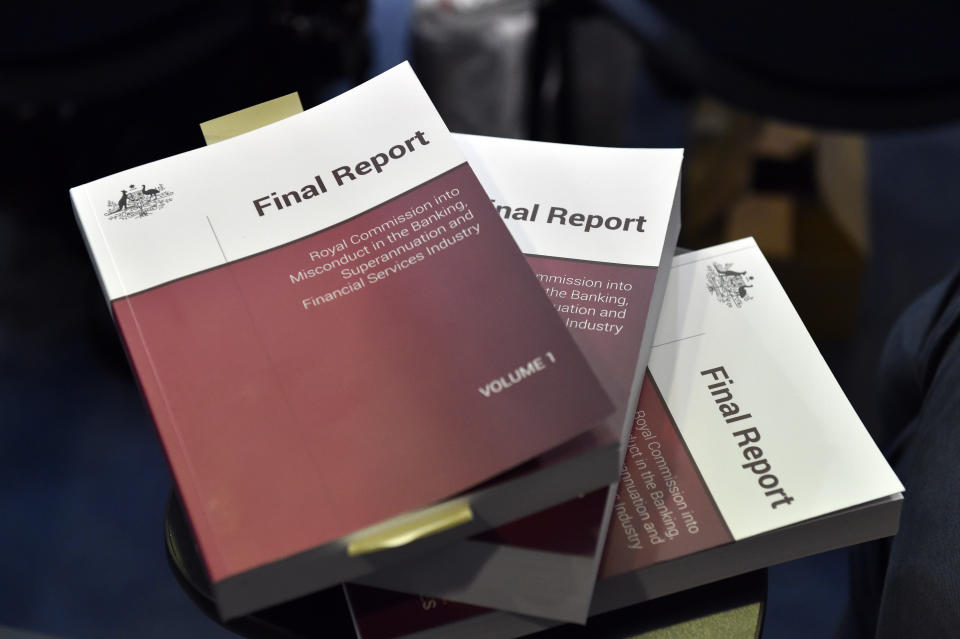Banking Royal Commission, one year on: What’s changed?

One year ago today, Royal Commissioner Kenneth Hayne handed down the Final Report to the Royal Commission into Misconduct in the Banking, Superannuation and Financial Services Industry.
The report contained 76 recommendations aimed at addressing what, in his words, boiled down to “greed – the pursuit of short-term profit at the expense of basic standards of honesty” – that had been aired during the major inquiry.
5 February 2019: Banking Royal Commission: What do the findings mean for you?
Jobs lost: Hundreds of bank executives sacked since the Royal Commission
But one year on, what’s changed? Are consumers actually better off now than they were a year ago? Has anything shifted in the banks’ culture that led to so much wrongdoing? Yahoo Finance took a look.
Banking Royal Commission recommendations: A work in progress
According to a statement from Treasurer Josh Frydenberg, the government has so far implemented 16 of the 76 recommendations; eight pieces of legislation are currently before parliament; and 35 are still awaiting to be introduced to parliament.
Most recently, the federal government released draft legislation on 22 recommendations for public consultation, with submissions due by 28 February.
So what’s actually changed? Are customers better off?
From changes made to banks’ company culture and the way bank staff are paid, to tighter surveillance on the banks and harsher penalties for wrongdoing, customers are better off in a number of ways.

Here’s a quick run-down of how consumers will benefit from the changes made since the Royal Commission.
Banks will follow a new Code of Practice, which is binding on the 25 banks that have signed it. You can read more about the new Banking Code of Practice here.
No more pushy financial salespeople, because sales incentives for frontline staff have been abolished.
Protection for vulnerable customers, with new rules for debt collection services and new guidelines for more inclusive access for customers with disability.
Compensation for ripped-off customers. $5.8 billion has been set aside by banks to refund customers and for remediation programs.
Banking staff will be under a tighter leash. The government rolled out the Banking Executive Accountability Regime (BEAR), which demands that a banking institution provide to APRA a detailed outline about what each banking executive is accountable for in the business.
Harsher penalties and longer jail time for white-collar criminals.
More powers for the corporate watchdog ASIC to probe banks and ban individuals from the industry.
ASIC is more willing to take banks to court, with its new ‘why not litigate?’ approach to enforcement.
Banks will be forthcoming with their affordable banking products such as basic, low- or no-fee banking accounts, especially to lower-income earners or if you have a senior, health card or concession card.
Aussies can go to a ‘one-stop shop’ to resolve financial disputes, the Australian Financial Complaints Authority. Previously, there were three bodies to turn to.
You can now see how your financial institution handles complaints, with the release of AFCA’s Datacube that publishes information about the types and outcomes of complaints.
Banking heads have rolled
Broadcast online for the world to see, bank chiefs squirmed in the hot seat under rigorous questioning by the counsels assisting Hayne – and dozens of bank staff, including bank chiefs, lost their jobs.
In August 2017, before the Royal Commission was even announced, the financial crime watchdog AUSTRAC launched civil proceedings against CBA for failing to report 53,700 breaches of money laundering and counterterrorism-financing laws.

Under pressure, then-CBA CEO Ian Narev eventually announced his resignation, followed by CBA wealth management group executive Annabel Spring when APRA announced a special inquiry into the bank.
During the Hayne Royal Commission, three other CBA executives lost their jobs, and the bank has since axed 41 senior employees, with nine others resigning.
AMP’s chief Craig Meller was the first of the major financial services institution bosses to lose his job in the inquiry during April 2018, and was followed soon after by AMP chair Catherine Brenner.
In October 2018, ANZ fired more than 200 staff for wrongdoing, with 10 senior executives caught up in that. ANZ CEO Shayne Elliott has managed to hang onto his job since he was appointed in January 2016, making him the only CEO to keep the top job since the Royal Commission began.
When the Final Report was released in February last year, Royal Commissioner Kenneth Hayne singled out NAB in particular for its lack of cooperation, which saw NAB CEO Andrew Thorburn and chair Ken Henry resign from their jobs.
In late November last year, when AUSTRAC took Westpac to court over 23 million instances of money-laundering failures tied with child exploitation, bank CEO Brian Hartzer stepped down, alongside chairman Lindsay Maxsted.
A new chair has since been appointed, and he will be in charge of finding a new CEO.
What’s been done to change the aggressive sales culture?
Well after the Royal Commission ended, the question about how much actual impact the inquiry would make lingered. Will anything actually change in the cultures of the banks that facilitated and promoted such wrongdoing?
University of Sydney Business School associate professor Eliza Wu believes that the tighter remuneration rules and governance standards have effectively changed behaviour.
“There is definitely a seismic cultural shift and a conscious change in mindset at all levels within financial institutions in terms of the need for improved conduct, governance and culture,” she said.
Now read: Four stories from the Royal Commission that shocked and appalled
Now read: Royal commission shines light on disability exploitation
Now read: Insurer sold policy to ‘distressed’ man with Down Syndrome
Now read: Aussies misled by CommInsure ads
“The aggressive sales culture is gone with much of the financial incentives removed that were underpinning that culture. There is a widely shared perspective now that people need to be put before profits.
“The banking scandals have also worked to increase general awareness and levels of financial education within the community and this has also accelerated the positive changes that we have observed since the Royal Banking Commission.”
UNSW professor Mark Humphery-Jenner agrees, adding that the banking sector now has a greater emphasis of acting in consumers’ best interests, and that banks are on notice about how regulators might penalise them.
What still needs to change?
One year on, there is still much more work left to be done.
“When structuring reforms, the government does face a balancing act,” Humphery-Jenner told Yahoo Finance.
“The government should ensure that banks act in consumers' best interests. But, it is important to avoid regulatory overreach or unintended consequences.”
For instance, too much government intervention will deter lending, which may impact a customer’s access to credit. Reducing staff remuneration by too much will see talent move away from companies or from the sector altogether, and could even see prices rise for the customer.
“The government must also be cognisant of banks' access to international money markets, as actions that would undermine this could translate into higher borrowing costs for consumers,” he added.
The government still needs to pass 38 pieces of legislation, meaning there is still a fair way to go.

And while the government declared initially that it would legislate all of Hayne’s 76 recommendations, it has since pulled back on the pledge to ban trailing commissions for mortgage brokers.
However, the mortgage broker industry pushed back hard on this, arguing that 70 per cent of its members would lose their livelihoods if commissions were removed.
Five weeks after the release of the Final Report, Frydenberg said the government would call for a review on trail commissions on new loans in three years’ time.
According to Wu, regaining the trust of Australians will be a long slog – and new players in the financial industry will be seeking to differentiate themselves by being transparent, upfront, and low-cost.
“The cultural shift away from banking for profit has no doubt begun but still has some way to earn street credibility,” she said.
“There are new entrants into the banking sector who are directly challenging incumbent banks’ business models and this will continue to work to force the necessary changes expected by the Australian public.”
Catch up: Banking Royal Commission Final Report
Need to catch up on what the final report says? Yahoo Finance wrote a handy summary of what the Banking Royal Commission means for you here.
You can also access the final report, the interim report, or browse case studies here.
Make your money work with Yahoo Finance’s daily newsletter. Sign up here and stay on top of the latest money, property and tech news.

 Yahoo Finance
Yahoo Finance 
